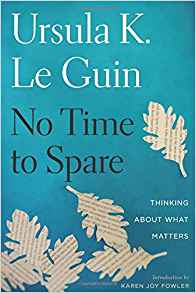Gary K. Wolfe Reviews No Time to Spare: Thinking about What Matters by Ursula K. Le Guin
 No Time to Spare: Thinking about What Matters, Ursula K. Le Guin (Houghton Mifflin Harcourt 978-1-328-66159-3, $22.00, 218pp, hc) December 2017.
No Time to Spare: Thinking about What Matters, Ursula K. Le Guin (Houghton Mifflin Harcourt 978-1-328-66159-3, $22.00, 218pp, hc) December 2017.
Has the SF arena ever produced a more widely respected public intellectual than Ursula K. Le Guin? Back in the days of the space race, Asimov, Heinlein, or Bradbury would occasionally get hauled before the TV cameras to celebrate all the SFnal dreams that were about to come true (but most didn’t), and even today prominent writers get interviewed for think-pieces about climate change or dystopias, but for the most part the focus is limited to a few familiar SF themes that seem to be echoed in the news. Le Guin doesn’t pass herself off as an expert on such things, and she doesn’t need to: her clarity of thought and expression, both in fiction and nonfiction, have earned her respect simply as a writer, and not just of SF or fantasy. The latest evidence of this is No Time to Spare, a collection of short essays originally published on the blog that she hesitantly began writing in 2010. They touch upon SF and fantasy mostly only in passing, but they are a delight to read solely on the basis of wit, temperament, style, and ideas – even as the topics range from getting old, to answering fan mail from kids, to the adventures of her cat named Pard (I know, cat tales are the mother of all internet memes, but Le Guin manages to be both fresh and funny, even suggesting insights on the current state of the “human/animal interface”).
But “The Annals of Pard” serve mostly as entertaining intermissions between the four major sections of the collection, “Going over Eighty”, “The Lit Biz”, “Trying to Make Sense of It”, and “Rewards”, the latter of which is something of a catch-all ranging from a discussion modern composers like Philip Glass and John Luther Adams to various encounters with animals (a lynx, a rattlesnake) to a very touching tribute to her longtime friend and assistant Delores Pander. “The Lit Biz” may be of greatest interest to readers of this magazine, and it begins with a very funny screed on how overuse in film and literature has all but drained terms like “fucking” and “shit” of their linguistic power (“I mean they don’t seem to have any adjective to describe fucking except fucking even when they’re fucking fucking“). Later on, though, she almost offhandedly offers stunning insights about various types of literature. A piece on Homer, for example, suggests that “his two books are the two basic fantasy stories: the War and the Journey.” She takes on the rather worn-out idea of the Great American Novel, pointing out that, basically, who cares? – but then rather surprisingly offers up The Grapes of Wrath as a candidate (while pointing out that Steinbeck was the uncle of a close childhood friend).
Le Guin’s valorization of the power of story has been one of her consistent themes, and here she illustrates it by discussing two contrasting examples of compulsive storytelling, even though one, Kathryn Stockett’s The Help, is based on a “hokey, sentimental notion” while the other, Rebecca Skloot’s The Immortal Life of Henrietta Lacks, builds its narrative from “clear thought, honest feeling, and passionate integrity.” Lest anyone misinterpret this as a preference for non-fiction (as Le Guin suggests Dickens’s Mr. Gradgrind might argue), the very next piece, “It Doesn’t Have to Be the Way It Is”, proves to be a stirring defense of the fantastic tale, returning to an argument regarding the meaning of “escapism” that Le Guin has made before (as did Lewis and Tolkien). But she makes the additional point that, as her essay title suggests, fantasy is inherently subversive by its presentation of alternatives. She finds it “hard for me to imagine that anyone who likes science can dislike fantasy” since both are based on “the admission of uncertainty.” While she doesn’t quite develop the argument, this could be an important way of understanding why so many SF readers enjoy fantasy, and vice versa. She also suggests a synergy between utopia and dystopia, which echoes something similar.
Readers who have followed Le Guin’s essays in her earlier collections (or, of course, her blog itself) will find a good deal that’s familiar in these pages, but there are surprises as well, as well as a certain refined clarity and brevity in her voice – no less acerbic or angry when it needs to be (and there’s a wonderful meditation on the value and limitations of anger), but as always, eminently humane and sensible – and utterly necessary. The blog turned out to be a good idea after all.
Gary K. Wolfe is Emeritus Professor of Humanities at Roosevelt University and a reviewer for Locus magazine since 1991. His reviews have been collected in Soundings (BSFA Award 2006; Hugo nominee), Bearings (Hugo nominee 2011), and Sightings (2011), and his Evaporating Genres: Essays on Fantastic Literature (Wesleyan) received the Locus Award in 2012. Earlier books include The Known and the Unknown: The Iconography of Science Fiction (Eaton Award, 1981), Harlan Ellison: The Edge of Forever (with Ellen Weil, 2002), and David Lindsay (1982). For the Library of America, he edited American Science Fiction: Nine Classic Novels of the 1950s in 2012, with a similar set for the 1960s forthcoming. He has received the Pilgrim Award from the Science Fiction Research Association, the Distinguished Scholarship Award from the International Association for the Fantastic in the Arts, and a Special World Fantasy Award for criticism. His 24-lecture series How Great Science Fiction Works appeared from The Great Courses in 2016. He has received six Hugo nominations, two for his reviews collections and four for The Coode Street Podcast, which he has co-hosted with Jonathan Strahan for more than 300 episodes. He lives in Chicago.
This review and more like it in the February 2018 issue of Locus.







